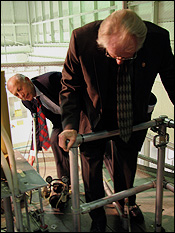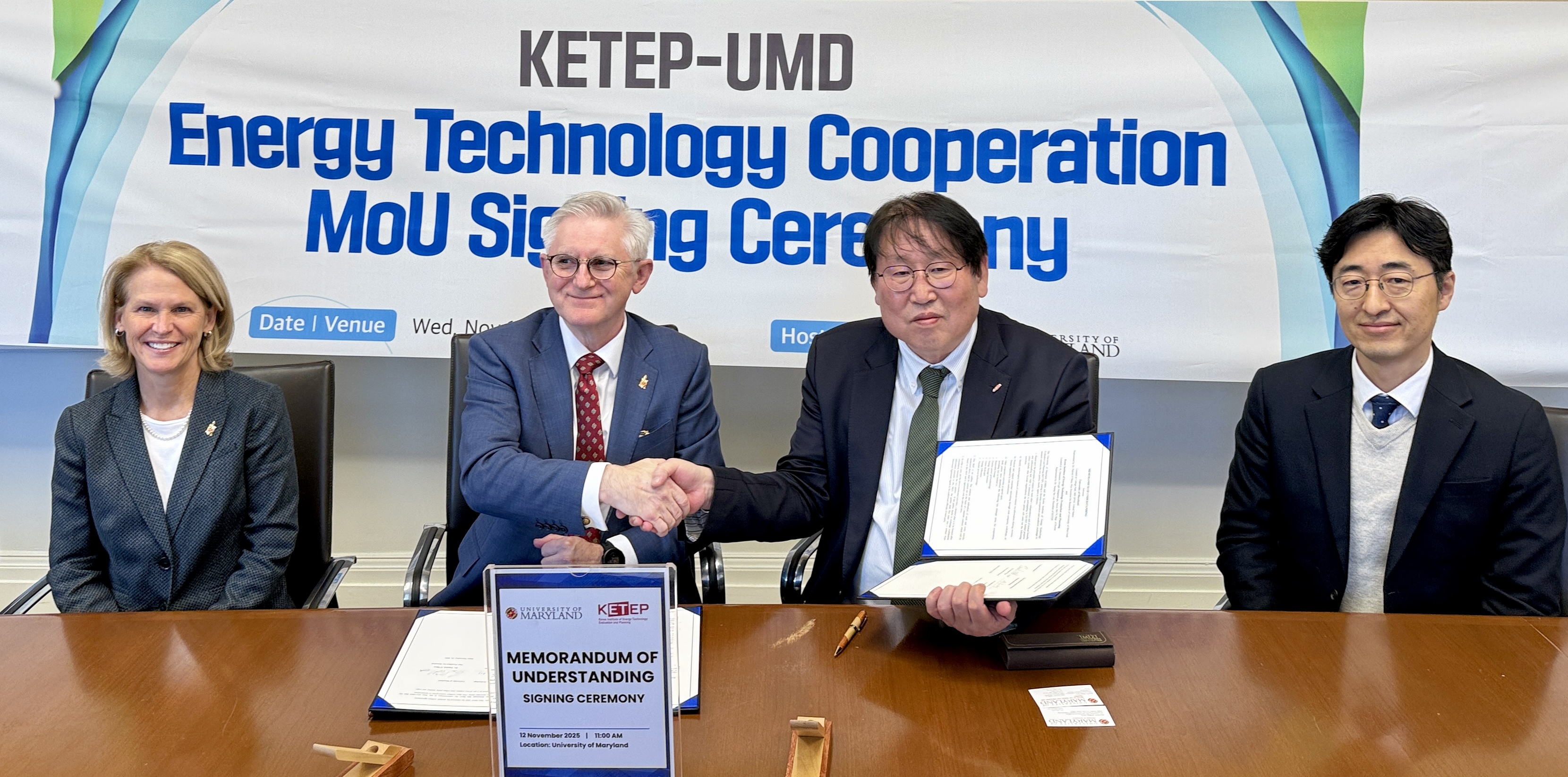News Story
Special Panel Discusses Future of Oil, Nuclear Energy

Keynote speaker Congressman Dr. Roscoe Bartlett (Md. 6th District; M.S. '49 and Ph.D. '52, Zoology; standing in front) examines the University's training reactor during a tour before the panel.
David C. Brown, Vice President of Federal Affairs for Exelon Corporation (a provider of electric and natural gas distribution, and the largest nuclear operator in the U.S.), directs the company's outreach to both the Executive and Legislative Branches of the Federal government. His presentation, The Role of Nuclear Energy in Our Future, described what would be required to maintain a successful nuclear energy program in the U.S., and the challenges nuclear energy providers face.

|
|
Left: Panelist David C. Brown, Vice President of Federal Affairs, Exelon Corporation. Right: Panelist Colonel Paul E. Roege, P.E., manager of the Reserve Component Program for the U.S. Army Nuclear and Combating WMD Agency.
|
|
Negative public perception of nuclear energy, Brown said, could be overcome by implementing what he called "The New Nuclear," a model that addresses seven issues critical for the acceptance and success of the industry:
- market demand for baseload power;
- the use of new and improved reactor technologies currently found in Europe;
- a predictable regulatory process that makes construction and startup of plants less likely to be interrupted or abandoned;
- a reestablished nuclear infrastructure, including a manufacturing base and skilled work force;
- acceptable financial returns for investors, supported by tax credits, regulatory delay insurance, and a loan guarantee program;
- a plan for used fuel disposal, including storage and recycling; and
- building public confidence in nuclear power.
Nuclear Energy for Military Applications was presented by Colonel Paul E. Roege, P.E., manager of the Reserve Component Program for the U.S. Army Nuclear and Combating WMD Agency (USANCA). Roege, who has primarily served with the Army Corps of Engineers during his 28-year career, is a nuclear engineer who in 2003 spent time in Iraq restoring its oil systems, which presented numerous logistics and security challenges.
Roege's presentation illustrated the differences in decision-making and needs between the civilian and military sectors when fulfilling energy requirements. All branches of the military have long supply chains that must be capable of uninterrupted delivery of supplies and energy to remote bases. Liquid fuel takes up space, is expensive and dangerous to transport, and requires significant storage areas at its destinations. The more troops in the field, the more fuel that needs to be shipped, the more personnel are required for security and handling, who in turn will require more vehicles and fuel themselves—a wasteful cycle. Nuclear energy, Roege said, has the potential to ease these problems. Compact, self-contained, portable reactors would require no refueling, give off no emissions (good for both the environment and concealment), could provide power in domestic or civilian emergencies, and are fueled by uranium, a material the U.S. does not need to import. However, safety and security concerns, as well as cost and international nuclear treaty issues, must be addressed before they can be deployed successfully.
The final panelist to present was keynote speaker Congressman Dr. Roscoe Bartlett (Md. 6th District), a Maryland alumnus (M.S. '49 and Ph.D. '52, Zoology) and one of only three scientists currently serving in Congress. Before being elected in 1992, Bartlett pursued successful careers as a professor, research scientist and inventor, small business owner, and farmer. Now in his 8th term, he is a member of numerous committees, including the Science Committee and two of its subcommittees: Energy and the Environment, and Research and Science Education.
Bartlett's presentation, titled The Role of Nuclear Energy in Our Nation's Future, painted a troubling picture of the U.S.'s energy situation, from an unheeded 1959 prediction of an oil peak and decline, to today’s population consuming several times more resources per person than in any other country. The nation, he said, has wasted valuable time since the decline in oil production was formally recognized in 1980: 97% of our transportation needs are based on oil, a figure unchanged since 1974, yet we produce only half the oil we did at that time. The most pressing matter, he told the audience, is to find a replacement for liquid fuel. "If we used all of our corn for ethanol," said Bartlett, "all of it—all 70 million acres...it would displace 2.4% of our gasoline [needs]....if we took all of our 60 million acres of soybeans and converted that to soy diesel, it would displace 2.9% of our diesel [needs]."
Bartlett advocated conservation, efficiency, exploring other energy options such as nuclear, geothermal, and hydroelectric power, and training more nuclear and metallurgic engineers.
The next panel in the series, National Security Consequences of U.S. Oil Dependency, will be held February 8, 2008. Admiral Skip Bowman (Ret.) will serve as the keynote speaker. (Event information »)
For More Information:
- Watch a video of the panel discussion »
- Congressman Bartlett’s Energy Updates web site »
- ANSSC Brings Energy Experts to Campus »
- Interested in energy issues?
You may also enjoy the Clark School's Transforming Energy Lecture Series.
Published December 7, 2007









